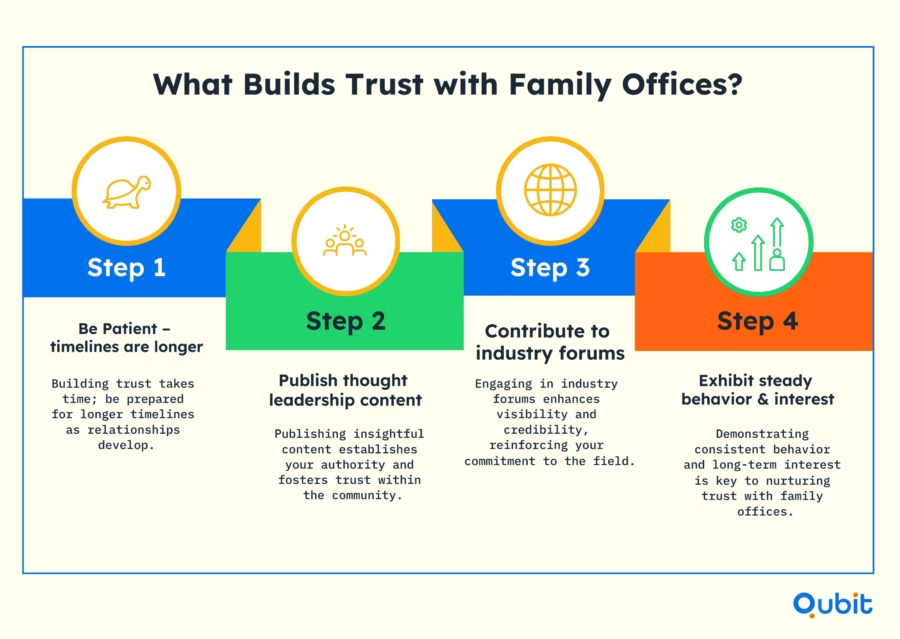Establishing meaningful connections with family offices is a cornerstone for founders seeking long-term support and strategic partnerships. These private investment entities, often driven by generational wealth and values, prioritize personalized engagement and trust over transactional interactions. Founders must understand the unique dynamics of family offices to foster relationships that extend beyond financial backing.
Comparative insights in family offices vs institutional investors illuminate distinct strategies and decision-making processes that complement your focus on cultivating relationships with family offices. By recognizing these differences, founders can tailor their approach to align with the priorities of family offices, ensuring a foundation for sustainable collaboration.
This blog explores actionable strategies to help founders build genuine, long-term engagement with family offices, unlocking opportunities for growth and shared success.
How to Build Strong Relationships with Family Offices
Establishing meaningful connections with family offices requires a thoughtful approach that prioritizes trust, personalized engagement, and long-term collaboration. These private entities, often managing significant wealth, are deliberate in their decision-making and value relationships built on mutual benefits. Below, we outline actionable strategies to help founders and professionals foster strong ties with family offices.

1. Secure Warm Introductions
The foundation of any successful relationship begins with the right introduction. Cold outreach often falls flat, but leveraging platforms like the Family Office List can provide verified contact details and insights into investment interests. Research shows that personalized connection requests have an acceptance rate of approximately 50%, making tailored outreach essential.
When crafting your introduction, focus on empathy and clarity. For example, studies indicate that email subject lines under 50 characters significantly improve open rates. A concise subject line demonstrates respect for the recipient’s time while piquing their interest.
2. Prioritize Trust-Building
Trust is the cornerstone of any relationship with family offices. These entities often operate with slow timelines and deliberate decision-making processes, meaning patience is key. Highlighting success stories where founders nurtured relationships over time can be a powerful way to demonstrate your commitment to long-term engagement.
Additionally, publishing original, data-backed insights in reputable industry forums can elevate your credibility. Thought leadership not only raises visibility but also establishes you as a trusted voice within family office circles.
3. Deliver Unconditional Value
Family offices appreciate relationships that offer genuine value without immediate expectations. Whether through sharing industry insights, connecting them with relevant opportunities, or supporting their philanthropic goals, demonstrating your willingness to contribute unconditionally can set you apart.
Attending curated events, provides an excellent opportunity to network in intimate settings. These gatherings allow you to engage directly with family offices, fostering authentic connections that go beyond transactional interactions.
4. Maintain Consistent Communication
Consistency is vital for relationship building. Regular updates, whether through newsletters, personalized emails, or calls, keep you top of mind while showcasing your reliability. However, it’s crucial to strike a balance—overcommunication can be counterproductive.
5. Focus on Mutual Benefits
Strong relationships thrive on reciprocity. Family offices are not just looking for investment opportunities; they seek partnerships that align with their values and goals. By understanding their priorities—whether it’s impact investing, wealth preservation, or supporting innovative startups—you can position yourself as a valuable collaborator.
You’ll also find key differences in how investors approach collaboration, especially when comparing types of investors in startups, which can influence how you tailor outreach and build trust with each group.
For real-world examples of successful founder-family office collaborations, explore startups funded by family offices. These case studies illustrate how personalized engagement and mutual benefits can lead to fruitful partnerships.
Optimize Operations with Family Office CRM Automation
Centralizing Relationship Data for Efficiency
Family office CRMs are designed to consolidate diverse data points, including contact details, interactions, and deal information. This centralization eliminates the inefficiencies of traditional spreadsheets and outdated systems, which can cost teams hundreds of hours annually in manual data entry. Platforms like 4Degrees excel in automating relationship management, enriching profiles with third-party data, and providing a unified view of operations.
By integrating tools that specialize in relationship intelligence, family offices can track interaction touchpoints across networks and analyze deal flow with greater transparency. This capability not only saves time but also ensures that critical information is readily accessible for strategic planning.
Automating Data Entry and Reporting
Automation is a game-changer for family offices aiming to improve operational efficiency. Modern CRMs like 4Degrees Relationship Intelligence CRM automate data entry, reducing human error and freeing up valuable time for high-priority tasks. These platforms also deliver actionable, real-time reporting, uncovering opportunities and tracking relationship progress seamlessly.
For example, implementing 4Degree allows family offices to unify diverse data points, automate portfolio tracking, and optimize fundamental workflows. This automation aligns with the growing trend of cloud-based SaaS CRM adoption, which is increasingly embraced by family offices to consolidate disparate systems and streamline complex deal pipelines.
Supporting Strategic Decision-Making
Real-time reporting and centralized data empower family offices to make informed, data-driven decisions. By adopting CRM automation, teams can gain insights into deal flow transparency and relationship dynamics, enabling them to identify opportunities and mitigate risks effectively.
For founders seeking deeper insights into how family offices assess potential investments, exploring family office investment criteria can refine their approach to aligning startup strengths with family office expectations.
Conclusion
Building meaningful relationships and enhancing operational efficiency are essential for success in any business endeavor. By focusing on genuine, long-term connections with family offices, you create a foundation of trust and mutual understanding that drives sustainable growth. The strategies discussed throughout this article emphasize the importance of thoughtful outreach, consistent communication, and personalized engagement.
We encourage you to take actionable steps to integrate these approaches into your efforts. Whether it's refining your communication style or tailoring your outreach to align with the values of family offices, every small adjustment can make a significant impact.
If you're looking to secure the right investor connections, we at Qubit Capital can help with our Investor Discovery and Mapping service. Let us assist you in identifying and connecting with investors who align with your vision and goals.
Key Takeaways
Family offices emphasize relationship-driven engagement, valuing trust, alignment, and long-term compatibility over purely transactional interactions.
Warm introductions, referrals, and participation in curated networking events are crucial for gaining access and establishing credibility within the family office ecosystem.
Implementing specialized CRM systems can greatly enhance relationship management by streamlining operations, tracking touchpoints, and delivering real-time insights into investor behavior and preferences.
Success with family offices requires patience and persistence, often supported by trusted advisors who can help bridge connections and maintain ongoing dialogue.
Founders who adopt data-informed strategies — paired with practical, relationship-building tactics — are better positioned to create meaningful, lasting partnerships with family offices that align with their mission and growth trajectory.
Frequently asked Questions
How to connect with family offices?
Start by identifying family offices that align with your startup’s goals or industry focus. Research thoroughly to understand their interests and priorities. Warm introductions through mutual connections or trusted networks can significantly improve your chances of engagement. Personalized messaging that highlights shared values and objectives is essential for building rapport.


 Back
Back



